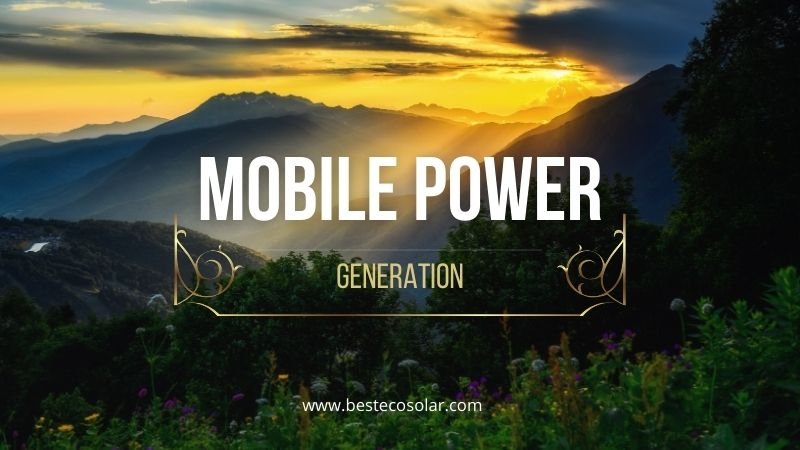Mobile Power Generation: The Future of Portable Energy Solutions
Imagine being in the middle of nowhere—no power outlets, no grid connection, but you still need electricity. What do you do? Enter mobile power generation, the game-changer for portable energy needs. Whether you’re camping, working remotely, or dealing with a power outage, mobile power solutions ensure you stay connected and powered up.
In this guide, we’ll dive deep into the world of portable power generation, exploring different technologies, benefits, and how to choose the best system for your needs. Let’s get started!
What Is Mobile Power Generation?
Mobile power generation refers to portable energy systems that provide electricity on the go. Unlike traditional power grids, these units are compact, easy to transport, and can be used in remote locations.

Why Is Mobile Power Important?
- Emergency Backup: Keeps essential devices running during outages.
- Off-Grid Living: Powers cabins, RVs, and remote worksites.
- Outdoor Adventures: Ideal for camping, festivals, and outdoor events.
Types of Mobile Power Generation Systems
Not all portable power solutions are the same. Here’s a breakdown of the most common types:
1. Portable Solar Generators
Harnessing the sun’s energy, these generators use solar panels to charge built-in batteries. They’re silent, eco-friendly, and perfect for outdoor use.
Pros:
✅ Renewable energy source
✅ Quiet operation
✅ Low maintenance
Cons:
❌ Dependent on sunlight
❌ Slower recharge times
2. Gasoline/Diesel Generators
The traditional choice for high-power needs, these generators burn fuel to produce electricity.
Pros:
✅ High power output
✅ Fast refueling
Cons:
❌ Noisy
❌ Requires fuel storage
3. Battery-Powered Generators
These lithium-ion or lead-acid battery packs store energy and release it when needed. Think of them as giant power banks.
Pros:
✅ Silent operation
✅ No emissions
Cons:
❌ Limited runtime
❌ Longer recharge times
4. Wind-Powered Generators
Small portable wind turbines can generate power in windy areas, which is ideal for boats or remote locations.
Pros:
✅ Works day and night
✅ Sustainable
Cons:
❌ Needs consistent wind
❌ Bulky setup
Key Features to Look for in a Mobile Power System
Not sure which system is right for you? Consider these factors:
- Power Output (Wattage)
- Small (100-500W): Phones, laptops, lights.
- Medium (500-2000W): Mini-fridges, power tools.
- Large (2000W+): RVs, medical equipment.
- Battery Capacity (Wh or Ah)
- Higher capacity = longer runtime.
- Portability
- Weight
- Handles/Wheels
- Recharge Options
- Solar
- AC outlet
- Car charging
- Power Output (Wattage)
Best Uses for Mobile Power Generation
- Emergency Preparedness
When storms knock out power, a portable generator keeps essentials like phones and medical devices running. - Outdoor Adventures
Camping without electricity? No problem! A solar-powered generator can charge your gear. - Construction & Remote Work
Job sites without power? A gas or battery generator keeps tools running. - RV & Van Life
For nomads, mobile power stations provide off-grid electricity.
How to Choose the Right Mobile Power Solution
- Step 1: Assess Your Power Needs
- Make a list of the devices you need to power and their wattage.
- Step 2: Decide on Fuel Type
- Solar = Eco-friendly but weather-dependent
- Gas = Powerful but noisy
- Battery = Quiet but limited runtime
- Step 3: Consider Budget
- Budget-friendly: Small solar generators
- Mid-range: Battery power stations
- High-end: Large gas/diesel generators
- Step 1: Assess Your Power Needs
Maintenance Tips for Longevity
Want your mobile power system to last? Follow these tips:
- Keep batteries charged (avoid deep discharges).
- Store fuel properly (stabilize gasoline).
- Clean solar panels regularly for maximum efficiency.
The Future of Mobile Power Generation
With advancements in battery tech and renewable energy, portable power is becoming:
- More efficient
- Lighter
- Cheaper
Expect solar and hydrogen-powered generators to dominate soon!
Conclusion
Mobile power generation is revolutionizing how we access electricity—whether for emergencies, adventures, or off-grid living. By understanding different systems and their best uses, you can pick the perfect portable energy solution for your needs.
Got questions? Check out the FAQs below!
FAQs
- How long do portable solar generators last?
Most last 5-10 years, depending on battery type and usage. - Can I use a mobile power station indoors?
Yes! Battery-powered stations are safe indoors, unlike gas generators. - What’s the best generator for an RV?
A 2000W solar or dual-fuel generator is ideal for RVs. - How do I calculate my power needs?
Add up the wattage of all devices you’ll run simultaneously. - Are portable power stations worth it?
Absolutely! They’re silent, eco-friendly, and versatile—perfect for most users.
You Might Also Like































